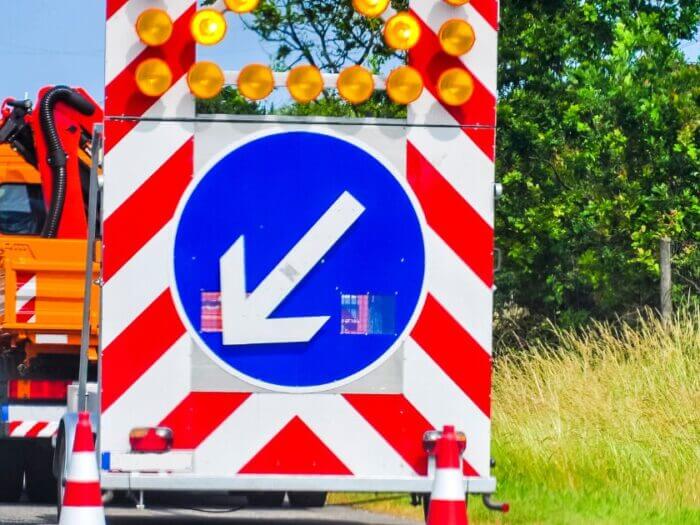A devilish dilemma within the road transport law, safety first or breaking the law?
Article 5.18 paragraph 1 of the Vehicle Regulations states:
“The load or parts thereof must be secured in such a way that under normal traffic situations, including full braking, sudden evasive manoeuvres and poor road surface, it cannot fall off the vehicle or endanger stability”.
A provision that seems completely clear and logical at first glance. After all, a load that is transported on public roads must be properly secured and not pose a danger.
What does this provision mean for companies that are professionally involved in working on public roads?
Companies that are professionally involved in working on public roads include, for example, companies that place and remove roadblocks and traffic signs.
This category of companies must make daily stops every 50 or 100 metres when placing and removing traffic signs or other signage to place or collect signage.
If after each stop the loose load (traffic signs, iron poles, tools, etc.) has to be secured with lashing straps and safety nets, this means that the employees and other road users are exposed to a great danger, because the traffic is rushing past at high speed and the vehicle and the loading platform have to be walked around to be able to remove or load the signage.
Multiple fines for violation of this article
At the beginning of 2022, several employees of my client – with five branches the market leader in the field of temporary traffic facilities for civil engineering – were fined for violation of article 5.18 paragraph 1 of the Vehicle Regulation. Coincidence or not, this happened most frequently at the branch near a police academy.
This client only uses double-manned vehicles that are specially equipped with 70-centimetre deep loading platforms, fitted with special floor pots anchored to the bottom of the loading platform for the vertical transport of traffic signs of approximately three metres.
Were these fines justified?
As a transport lawyer, I was asked whether these fines were justified or whether my client was allowed to instruct, from the perspective of traffic safety and providing a safe working environment for its staff, not to always secure the load if it is necessary to proceed expeditiously with short intermediate stops of 50 and 100 metres when placing and removing signage on public roads.
Bearing in mind the principle of good employment practices enshrined in law (Article 7:611 BW) and the statutory duty of care for an employer to provide a safe working environment (Article 7:658 BW), there was much to be said for the fact that due care was taken by giving the work instruction to its employees not to secure the load after every stop on the public road.
I was and am of the opinion that the legislator left a gap in the legislation and regulations by not including an exception for companies that are professionally involved in carrying out work on the public road.
Safety outweighs obligation to secure cargo
I also argued this before the subdistrict court judge, stating that the safety of the employees and other road users in this case outweighed the obligation to secure the cargo when collecting traffic signs at a road closure on a public road.
After weighing the pros and cons, the subdistrict court judge on duty came to the conclusion at the hearing that although there had been a violation of Article 5.18 paragraph 1 of the Vehicle Regulations, the nature of the work was such that it was understandable that the cargo was secured.
The written decision of the subdistrict court judge of the Gelderland court, Arnhem location, followed a few weeks later and read:
“annulment of the previously issued penalty decision, and conviction without imposition of a penalty”.
A judicial decision that the employee, his employer (my client) and I as a lawyer can agree with. The outcome of this procedure has been shared with one of my professional contacts, a skilled securing expert who teaches at police academies. Hopefully this lesson will be followed well and fines for improper cargo securing will be avoided.
Do you need legal assistance?
If you would like to be informed about your obligations as an employer in transport and/or infrastructure, please feel free to contact. You can reach me on 06-47892281 or by email info@transportrechtadvocaat.nl
Mr. Otto Lenselink
January 2023
More to read
- The Hague Court of Appeal quashes verdict in the Slotboom case
- The Hague Court of Appeal decides whether driver will pay for shortage of parking spaces
- Most important changes to the collective labor agreement for professional goods transport as of January 1, 2024
- Collaboration with Polish Law Firm
- Consequences of Deliveroo for the scope of the Collective Labour Agreement for Professional Freight Transport!
- Gelderland Court reduces parcel delivery driver’s fine by more than 80%
- Court of Justice restricts repeated fining for a single offence
- Tightening enforcement of driving and rest times and tachograph fraud by the ILT
- Criminal prosecution for tachograph fraud
- Fuel card fraud: who pays the bill?

